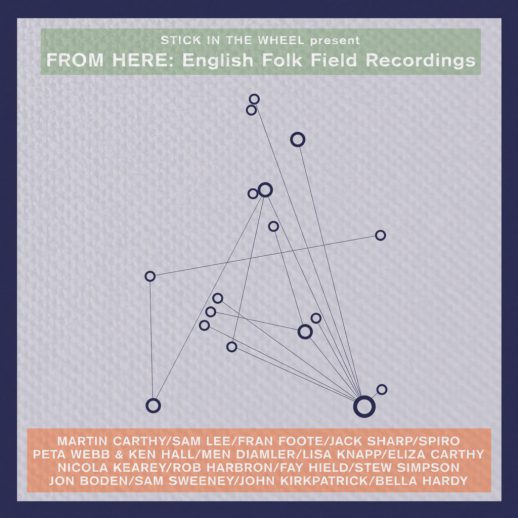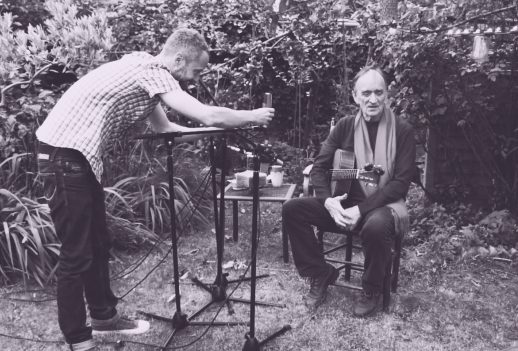VARIOUS – From Here : English Folk Field Recordings
(Released 17 March on From Here Records)
Review by Andy Childs
The idea behind this bountiful record, which is to present “a snapshot of English folk music right now”, is so ingenuously ambitious and artfully executed, it feels both like the beginning of a major project of contemporary musicology and plays like a dream open-mic session at the perfect folk club.
It’s been produced and curated by Nicola Kearey and Ian Carter of the folk group Stick In The Wheel, who “set out to make a collection of live recordings that get to the very heart of what folk music is about. We wanted to capture performances that were immediate and intimate. You feel like you’re in the room with the artists, witnessing a living, evolving tradition”. Hard to believe, but apparently new to the folk scene and unaware of who most of the artists on this record are, Kearey and Carter have clearly been well-advised and fortuitous in their artist selection. The array of talent assembled here is an intriguing mix of established artists such as John Kirkpatrick, Bella Hardy, Lisa Knapp and Martin Carthy – all well-known outside of the folk world, plus Stick In The Wheel members and associates, two ex-members of Bellowhead and musicians such as the excellent English concertina player Rob Harbron, Stew Simpson and the duo Peta Webb and Ken Hall – old hands on the folk circuit yet previously unknown, at least to this interested but casual observer.
As a “snapshot”, From Here makes no claim to be a definitive collection in any way and is perhaps not even representative of the state of traditional English folk music per se, thereby deftly avoiding the taint of daunting ernestness that in the past has tended to marginalise even the most accessible traditional folk music from the mainstream. At the same time, it’s no dilettantish undertaking either – even though the annotation for each song (presented as a fold-out sheet that is an invaluable complement to the music) is penned by each artist with a light touch, it more often than not disguises real scholarship and a devotion to traditional folk song and customs. As a result it is a listening experience totally unencumbered by expectation, and because these recordings are made in the ‘field’, so to speak, there’s a spontaneity and freshness about them that is warm and infectious. It’s also pivotal to the album’s sense of coherence that there is a theme running through it, as stated in the sleeve notes – “each artist was asked to think about what From Here meant to them – by way of place or geography, as a way of looking back to musical origins, or simply where they are at this very moment in time: ‘here’s what I am, this is where I’m from’ ”.
Many of the performances here are completely unaccompanied, and of these, Nicola Kearey’s broad Cockney rendition of ‘Georgie’ – “about a woman bawling out the coppers in the middle of the street because they’ve got her man for the paltry crime of stealing from a rich man”, Lisa Knapp singing ‘Lavender Song’ and Sam Lee airing what he boldly describes as “one of the best songs in the entire world”, ‘The Wild Rover’, are my favourites, although Stew Simpson’s arresting vocals on the curious ‘Eh Aww Ah Cud Hew’ are something to behold. Apart from the two wholly instrumental tracks here – and Spiro’s ‘Lost In Fishponds’ is one of the loveliest tunes I’ve heard anywhere for a long time – when musical accompaniment is at hand it’s nearly always sparse and never upstages the singer or the song.
One of the many virtues of this record is that it highlights the fact that the content – the tunes and the lyrics – of traditional folk music is constantly being updated and reinterpreted, breathing new life and relevance into songs that have timeless and universal themes. And far from being precious or purist about folk’s heritage, it seems generally accepted that an added verse here and there or a re-written tune is not only customary, but essential to the continuing well-being of folk music. In the sleeve notes the great Martin Carthy no less talks of going back over his old repertoire and resurrecting a song called ‘The Bedmaking’, which he has embellished with verses of his own in order to tell the song’s story more fully. “I don’t care”, he says, “I’ll tell anybody – it’s not a secret. I change songs”. There are also several insights into how these songs are handed down through the generations – Jon Boden mentions singing round the campfire at Forest School Camp and learning English folk songs, Sam Lee writes about “songs that I grew up singing on my summer camps as a kid”, and Sam Sweeney says that one of the two tunes he plays here, ‘Mount Hills’, he heard at the English Acoustic Collective Summer School as a teenager. Cassettes are exchanged, and books of song collections are studied – Bella Hardy’s choice, ‘The Ballad of Hugh Stenson’ is from The Ballads and Songs of Derbyshire and Lisa Knapp found ‘Lavender Song’ in Peter Kennedy’s Collection of Folk Songs of Britain and Ireland – “a brilliant, beautiful, tea-stained book”. Such is the way that this genre of music is preserved, nourished, embellished and made engaging for successive generations.
Ian Carter and Nicola Kearey have begun a project that could conceivably do more to broaden the appeal of traditonal folk music than any other venture in recent years that I can think of. At least I hope it’s just the beginning. They have hinted at more volumes like this to capture “the people we don’t know about, or couldn’t get”. The sooner they get back out there with their recording machine and two stereo mics the better.
*

